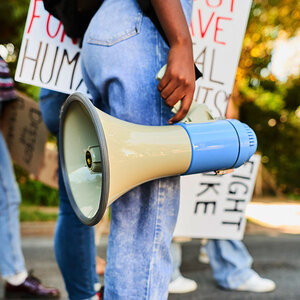Human rights grantmaking totaled $4.1 billion in 2019, study finds

Foundation funding in support of global human rights initiatives totaled $4.1 billion in 2019, up from $3.7 billion the previous year, a report from Candid and the Human Rights Funders Network finds.
The report, Advancing Human Rights: Annual Review of Global Foundation Grantmaking – 2019 Key Findings (47 pages, PDF), found that 761 funders awarded 26,621 grants in support of human rights to 15,629 recipients. The report documents a 10 percent increase from 2018 and a 242 percent increase over the past 10 years. At the same time, there are considerable regional disparities, with grants in North America growing at a greater rate than those in other regions, while sub-Saharan Africa notably saw a funding decline for a second year in a row.
The top 12 funders, which accounted for $1.92 billion, or 47 percent of total grant dollars (up from 45 percent in 2018 and accounting for more than 50 percent of funding growth), included the Ford Foundation ($459 million), Susan Thompson Buffett Foundation ($211 million), Foundation to Promote Open Society (Open Society Foundations, $197 million), John D. and Catherine T. MacArthur Foundation ($141 million), Oak Foundation ($138 million), Wellspring Philanthropic Fund ($137 million), Bill & Melinda Gates Foundation ($129 million), Robert Wood Johnson Foundation ($124 million), William and Flora Hewlett Foundation ($115 million), Silicon Valley Community Foundation ($110 million), NoVo Foundation ($93 million), and California Endowment ($66 million). Among the top funders, five saw increased funding for human rights; most notably the Ford Foundation boosted its human rights giving by $172 million (nearly 60 percent) and the MacArthur Foundation saw a 122 percent increase in related funding since 2018.
According to the study, funding by a matched set of grantmakers increased in six of nine issue areas, with the largest growth seen in support of racial and ethnic groups in total dollars, up $352 million to $994 million (a 60 percent increase) as well as women and girls (17 percent), migrants and refugees (9 percent), LGBTQI (9 percent), persons with disabilities (38 percent), and sex workers (11 percent). Three issue areas saw declines in support: children and youth (down 12 percent), Indigenous people (down 10 percent), and human rights defenders (down 36 percent).
In addition, the study found that the networked relationships of human rights funders and recipients continued to be a major feature of global funding, with more restricted and less direct funding for grants to organizations in the Global South and East. Groups that are awarded human rights grants in North America are five times more likely to receive direct, flexible support than those in sub-Saharan Africa and seven times more likely than groups in the Caribbean.
“We’re encouraged that human rights philanthropy continues to grow,” said Human Rights Funders Network executive director Kellea Miller. “But we can’t lose sight of the fact that human right grants only make up 2 [percent] to 8 percent of total foundation funding each year. We hope this report helps...foundations address the global imbalance in resourcing, increase direct, flexible funding,...and adapt an intersectional approach to giving.”
(Photo credit: Getty Images/AJ Watt)




